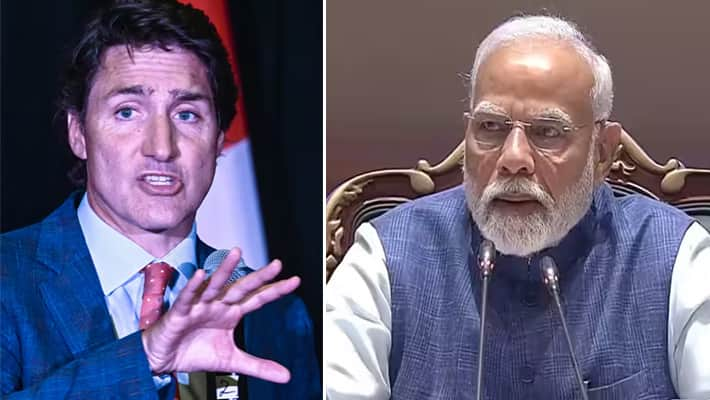
Amid a rapidly intensifying diplomatic standoff between India and Canada over the assassination of Khalistani terrorist Hardeep Singh Nijjar, New Delhi has reportedly taken a significant step by adding Sandeep Singh Sidhu, a Canadian Border Service Agency (CBSA) official, to its list of fugitive terrorists sought for deportation. Sidhu is accused of involvement in terrorist activities in India and has alleged ties to Pakistan-based Khalistani terrorists. The diplomatic row between India and Canada, sparked by the murder of Hardeep Singh Nijjar, a prominent pro-Khalistan figure, has drawn international attention.
Canadian Prime Minister Justin Trudeau and the Royal Canadian Mounted Police (RCMP) have publicly accused India of targeting Sikh separatists within Canadian borders. They claim Indian diplomats have shared intelligence on these individuals with organized crime groups in India, resulting in drive-by shootings, extortion, and even assassinations of Canadian citizens advocating for the Khalistan movement. In a series of statements, Canadian officials alleged that India’s top diplomatic personnel were behind the sharing of this sensitive information with organized crime syndicates, further stoking tensions between the two nations.
These accusations prompted India to expel Canada’s acting high commissioner and five other diplomats in retaliation, further deepening the diplomatic impasse. Sandeep Singh Sidhu, a CBSA official and reportedly a member of the banned International Sikh Youth Federation (ISYF), is accused of promoting terrorist activities in India’s Punjab region. Indian intelligence agencies claim Sidhu has ties to Khalistani terrorist Lakhbir Singh Rode, who operates out of Pakistan under the protection of the ISI, Pakistan's intelligence service.
Sidhu is also accused of playing a role in the assassination of Shaurya Chakra awardee Balwinder Singh Sandhu in 2020. Sandhu, a renowned figure in Punjab, was celebrated for his staunch resistance against Khalistani militants during the Punjab insurgency of the 1980s and 1990s. His assassination, masterminded by Khalistani operatives, was allegedly part of a larger plot to target individuals opposing the Khalistan movement and referendums led by groups like Sikhs for Justice (SFJ) in the US and Canada.
According to reports, Sidhu had been promoted to the rank of superintendent at the CBSA. Investigations by India’s National Investigation Agency (NIA) suggest that Canada-based Khalistani operatives, including one known as "Sunny Toronto," collaborated with Pakistan-based terrorists like Lakhbir Singh Rode in planning Sandhu’s murder. Indian authorities have not yet confirmed whether “Sunny Toronto” is an alias used by Sandeep Singh Sidhu.
India’s decision to list Sidhu among fugitive terrorists comes amid ongoing frustrations with Canada over the lack of action on extradition requests. At a press briefing, Ministry of External Affairs (MEA) spokesperson Randhir Jaiswal highlighted that at least 26 extradition requests sent to Canada over the past decade remain unaddressed. These requests include individuals linked to various criminal activities, including terrorism, drug trafficking, and organized crime.
“There are 26 extradition requests pending with the Canadian side, these are over the last decade or more. Along with that, there are several provisional arrest requests which are also pending with the Canadian side, involving certain criminals,” Jaiswal stated. Among the criminals India seeks to have extradited are members of the Lawrence Bishnoi gang, a notorious criminal syndicate.
Indian officials have shared intelligence with Canada about the gang's involvement in targeting Khalistan dissidents within Canada. Despite India’s requests for arrests, Canadian authorities have yet to act, further exacerbating tensions. Jaiswal expressed India’s dismay at the situation, noting the irony of Canadian authorities now accusing the Indian government of involvement in the same crimes India had previously warned them about.
“We find it really strange that now people who we wanted to be deported or action to be taken (against)...
we are being told that the RCMP is blaming the Indian side for crimes committed by these people in Canada,” he said. Canadian officials have alleged that gangs like the Lawrence Bishnoi group, operating on behalf of the Indian government, were responsible for targeting pro-Khalistan activists in Canada. These attacks reportedly include incidents of drive-by shootings, extortion, and murder, all aimed at silencing those advocating for an independent Khalistan.
Canada's accusations have been strongly denied by India. New Delhi has consistently reiterated that it respects the sovereignty of other nations and does not engage in extrajudicial operations on foreign soil. Nevertheless, the accusations have escalated the diplomatic crisis, with both nations recalling diplomats and issuing retaliatory measures.
.










